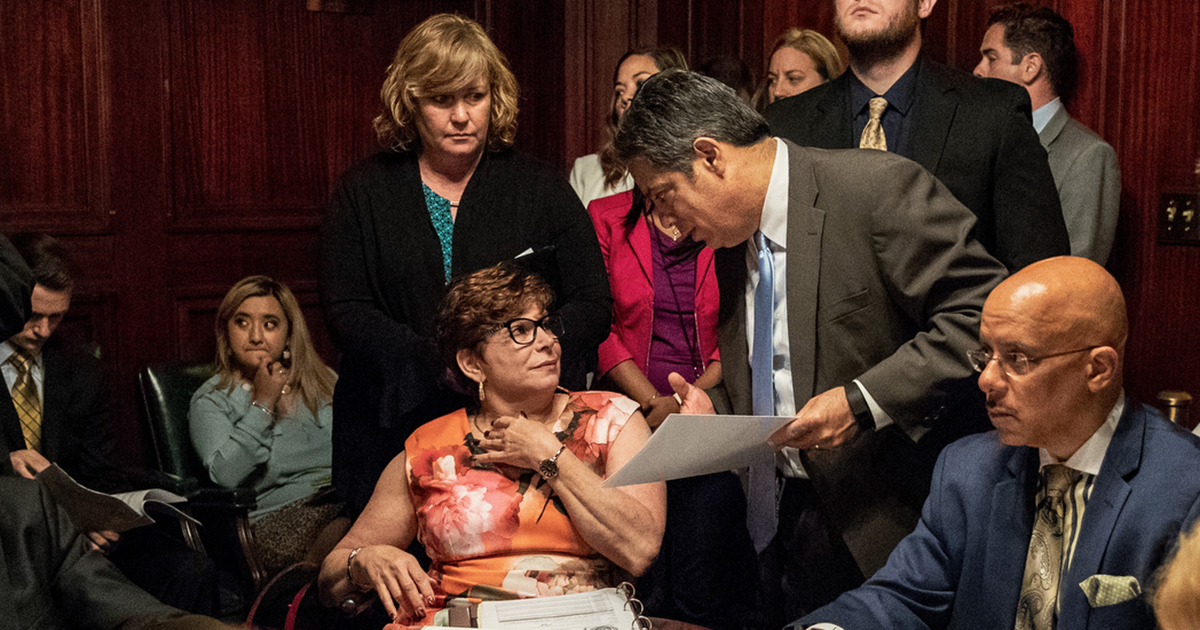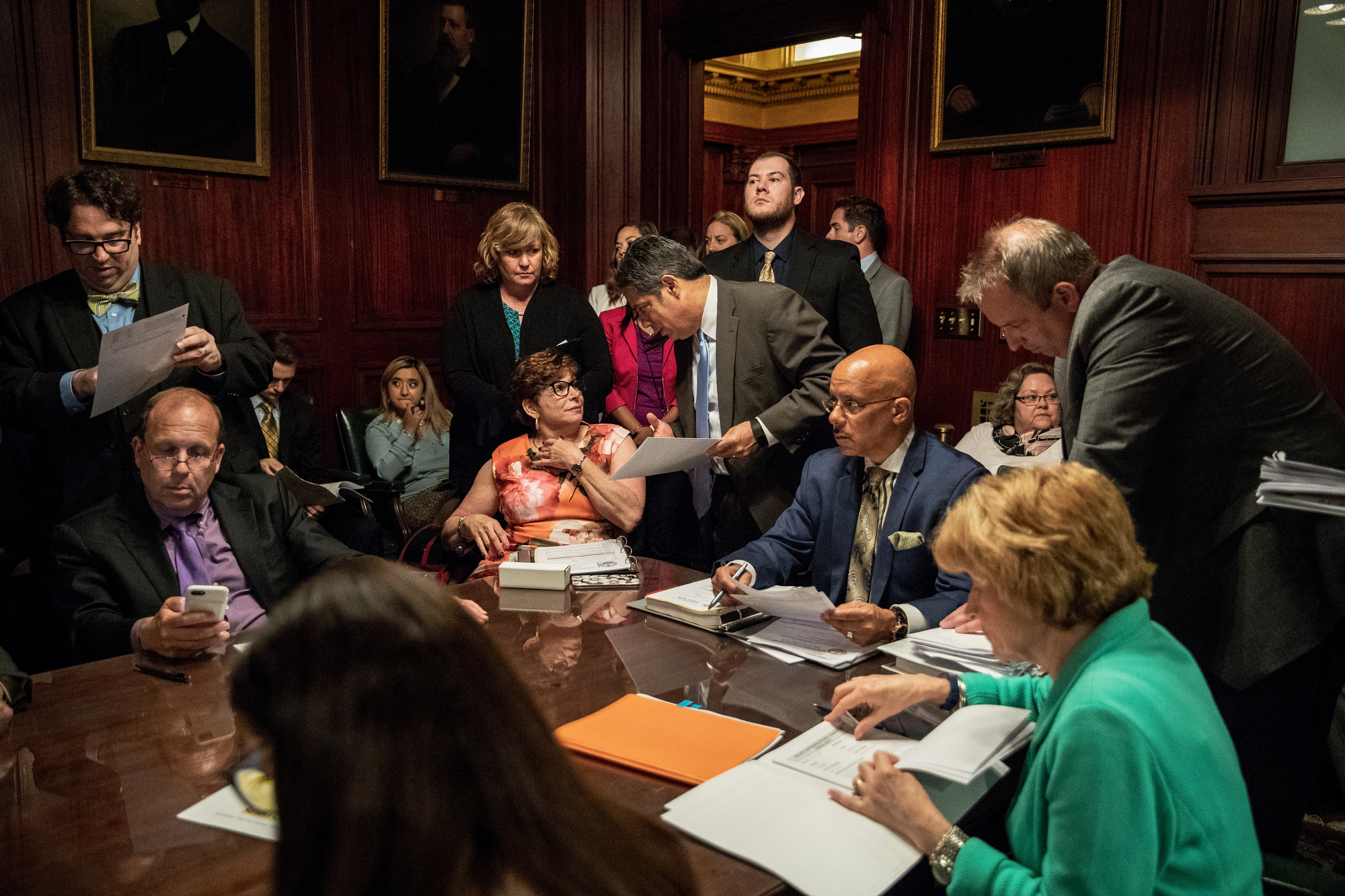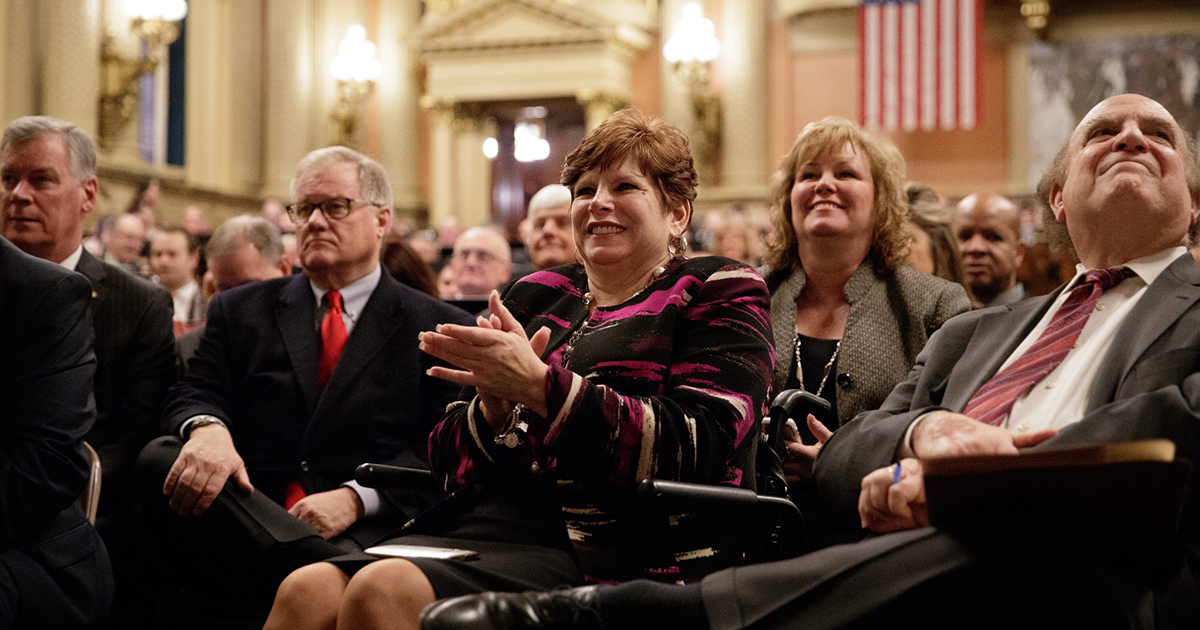
by Christin Brown | June 22, 2018 | News Releases
HARRISBURG, PA, June 22, 2018 – State Sen. Christine Tartaglione applauded today’s early passage of a Fiscal Year 2018-19 budget that includes new investments in workforce development, education, health care and social justice. The Senate voted, 47-2, in support of the budget (HB 2121) previously passed by the Pennsylvania House. The budget now awaits Gov. Tom Wolf’s signature.
“This budget is an example of the great things we can accomplish when we work together in a bi-partisan way to create programs that benefit all Pennsylvanians,” Tartaglione said. “As minority chairman of the Senate Labor and Industry Committee, I am especially proud of the workforce development initiatives, such as expanded apprenticeships and partnerships that involve labor organizations, vocational training facilities and the business community. These measures will help more young people find good careers that pay family-sustaining wages and benefits and will help the Commonwealth identify and satisfy its changing workforce needs.”
The approved budget includes a $30 million increase in the allocation for career and technical education through the PA SMART initiative. It also includes a new $7 million apprenticeship training program and a $3 million increase to industry partnerships, both through PA SMART, as well as a $3 million increase for combatting the Spotted Lanternfly infestation that threatens our agriculture industry.
Also today, the Senate unanimously approved the creation of the Keystone Scholars Grant Program through the passage of the omnibus Fiscal Code bill (HB 1929). The Keystone Scholars Grant Program will apply to every child born in Pennsylvania on or after Jan. 1, 2019. Upon receiving notice of a child’s birth, the Treasury Department will set aside $100 in a separate account that will be available to the child once they reach age 18 and enroll in a qualifying institution of higher education or a vocational or technical school. The student would be able to collect the $100, as well as investment earnings attributed to the account.
 “This Keystone Scholars Grant Program makes an important statement about our commitment to improving education opportunities for future generations of Pennsylvanians,” Tartaglione said. “As each child grows, this funding will grow and will provide them with another incentive to pursue post-secondary education or job training.”
“This Keystone Scholars Grant Program makes an important statement about our commitment to improving education opportunities for future generations of Pennsylvanians,” Tartaglione said. “As each child grows, this funding will grow and will provide them with another incentive to pursue post-secondary education or job training.”
During a busy day at the Capitol, Senator Tartaglione also joined members of the Philadelphia delegations in both the Senate and House, as well as other leaders in the General Assembly, to announce the House’s passage of a $60 million school and community anti-violence package. The legislation originated in the Senate as SB 1142 and sets aside $7.5 million for community anti-violence programs. In addition, municipalities, institutions of higher education, community-based organizations and other entities will be able to apply for funds to support anti-violence initiatives.
The Pennsylvania Commission on Crime and Delinquency will administer the grants through a School Safety and Security Committee. The objective is to reduce violence in schools by addressing it at the community level.
“This level of funding is unprecedented,” Tartaglione said. “Hopefully, this will become a watershed moment in our Commonwealth’s fight against violence in our schools and communities, particularly gun violence. I hope what we’ve accomplished today will usher in a new era of cooperation in the General Assembly on this critical issue.”
# # #
If you would like more information about this topic, please contact William Kenny at 215-533-0440 or email at William.Kenny@pasenate.com.

by Christin Brown | February 6, 2018 | Minimum Wage, News Releases
HARRISBURG, PA, February 6, 2018 – Sen. Christine Tartaglione applauded Gov. Tom Wolf’s commitment of $100 million toward workforce development programs as well as his support for raising Pennsylvania’s minimum wage in the Fiscal 2019 budget proposal that the governor delivered today to a joint session of the General Assembly.
Tartaglione is further encouraged by the governor’s intention to close the Delaware corporate tax loophole; his plan to expand access to substance abuse treatment and prevention; his renewed effort to require municipalities that rely exclusively on Pennsylvania State Police to pay for those services; as well as his call for more state investment in home- and community-based services for people with intellectual disabilities and autism spectrum disorders.
“I’m glad that Governor Wolf shares my conviction that Pennsylvania must improve its economic competitiveness by developing our workforce with programs like education and training, apprenticeships and industry partnerships, as well as mandating that employers pay workers fair, living wages.
“Just yesterday, I announced my sponsorship of Senate Bill 1044 to raise Pennsylvania’s minimum wage from $7.25 an hour to $15 over the next six years. We haven’t raised our minimum wage since 2006. All of Pennsylvania’s neighboring states and 28 states across the country have a higher minimum wage than we do. Raising the minimum wage will make Pennsylvania a more attractive place for workers to raise their families and will improve the economy by putting more money in the hands of consumers.”
During his budget address and in a more-detailed overview of his plan distributed through the Office of the Budget, Wolf proposed raising the minimum wage from $7.25 an hour to $12 this year.
Wolf also outlined a $50 million investment to improve access for Pennsylvania students and workers to education, training and career readiness programs; and $25 million to grow STEM and computer science-related education in K-12 and postsecondary programs. The budget plan further invests $7 million in apprenticeship and work-based training, along with $3 million for partnerships between employers and public workforce providers.
“These are issues that I’ve been attempting to advance for quite some time,” Sen. Tartaglione said.
Similarly, Sen. Tartaglione supports the governor’s renewed effort to close the “Delaware loophole.” That’s the law allowing Pennsylvania-based corporations to establish holding companies in neighboring Delaware, where their profits are not subject to a corporate income tax.
“For all intents and purposes, these corporations are Pennsylvania-based. They occupy land here and do business here. They should be paying their fair share of corporate taxes to support the infrastructure and services that enable them to succeed here.”
Requiring municipalities to pay for local State Police coverage is another Wolf proposal that would have a positive impact on Pennsylvania’s fiscal outlook, according to Sen. Tartaglione. The senator further supports the governor’s plan to allocate an additional $74 million to services for people with intellectual disabilities and autism, including $16 million to provide 965 people with supports and services enabling them to keep living in their homes and communities after they reach age 21 and no longer qualify for the special education system.
In the ongoing fight against substance abuse, specifically opioid use disorder, the governor plans to leverage $26.5 million in federal funding to supplement the state’s existing efforts to expand and sustain access to treatment services. Wolf also proposes a $4.5 million state allocation for training home-treatment providers and another $2 million to expand accredited drug treatment courts.
“Opioid addiction and opioid-related deaths have risen to catastrophic levels and are a public health crisis,” Sen. Tartaglione said. “We must commit significant resources strategically and thoughtfully in response to this emergency.”
# # #
If you would like more information about this topic, please contact William Kenny at 215-533-0440 or email at William.Kenny@pasenate.com.

 “This Keystone Scholars Grant Program makes an important statement about our commitment to improving education opportunities for future generations of Pennsylvanians,” Tartaglione said. “As each child grows, this funding will grow and will provide them with another incentive to pursue post-secondary education or job training.”
“This Keystone Scholars Grant Program makes an important statement about our commitment to improving education opportunities for future generations of Pennsylvanians,” Tartaglione said. “As each child grows, this funding will grow and will provide them with another incentive to pursue post-secondary education or job training.”
